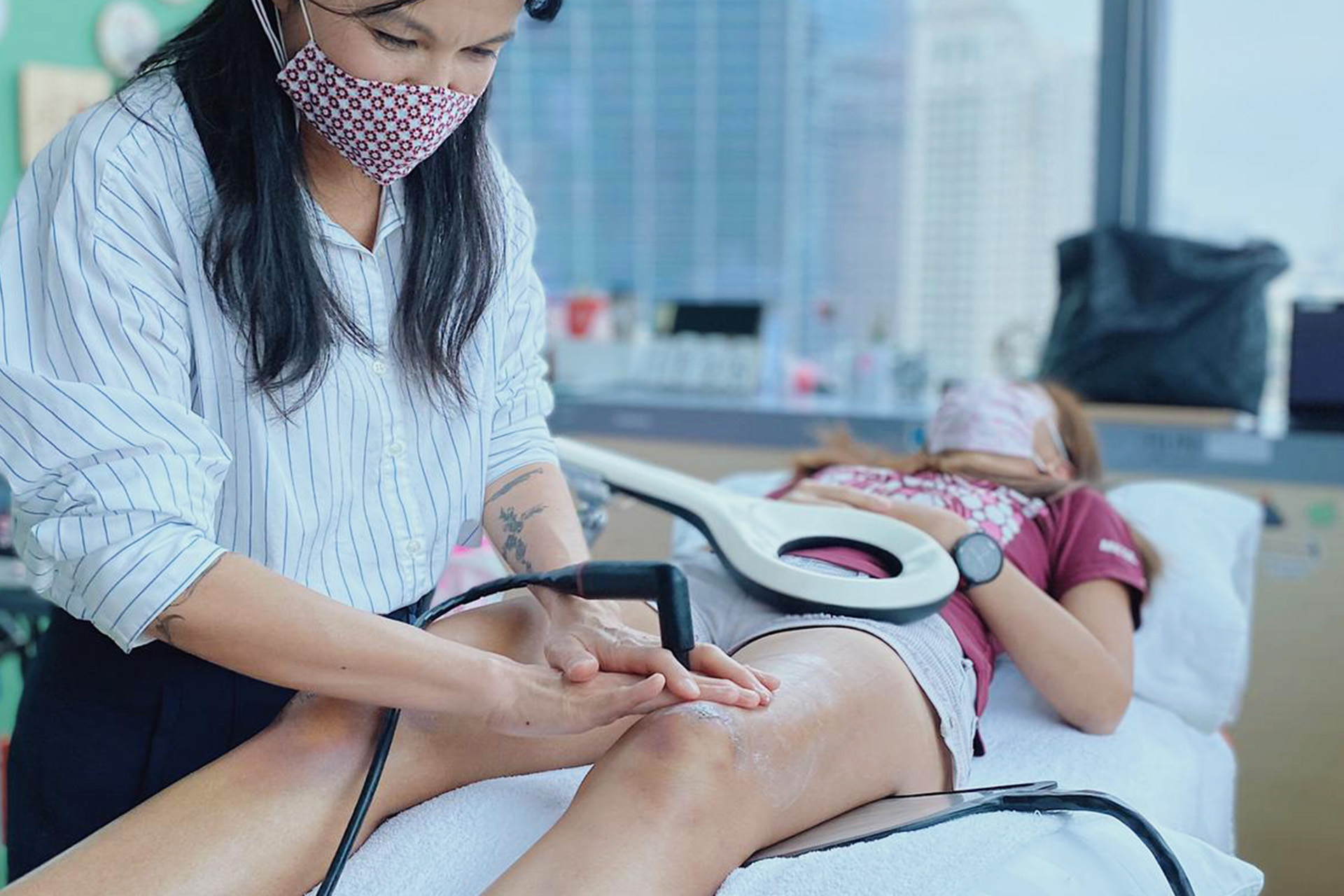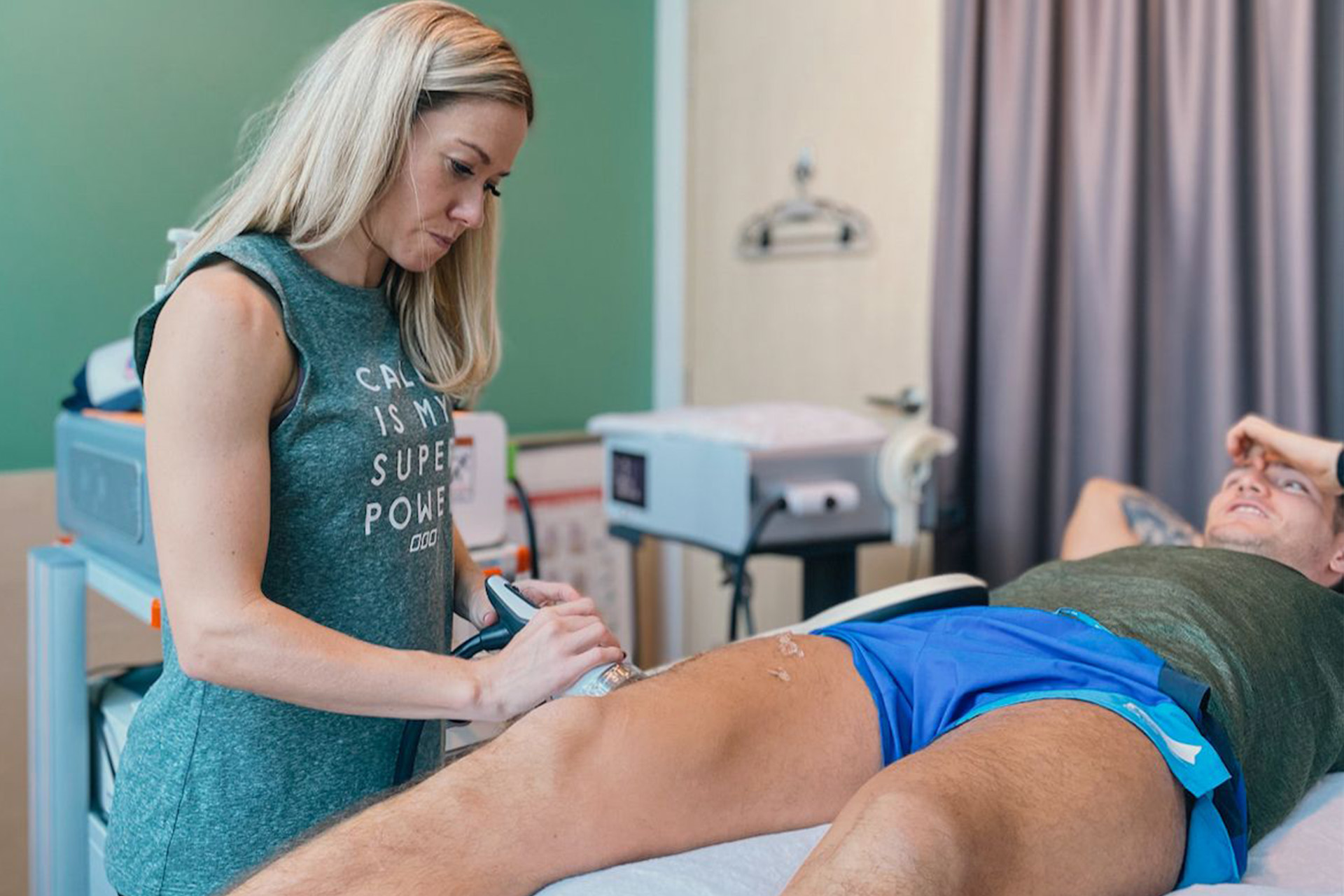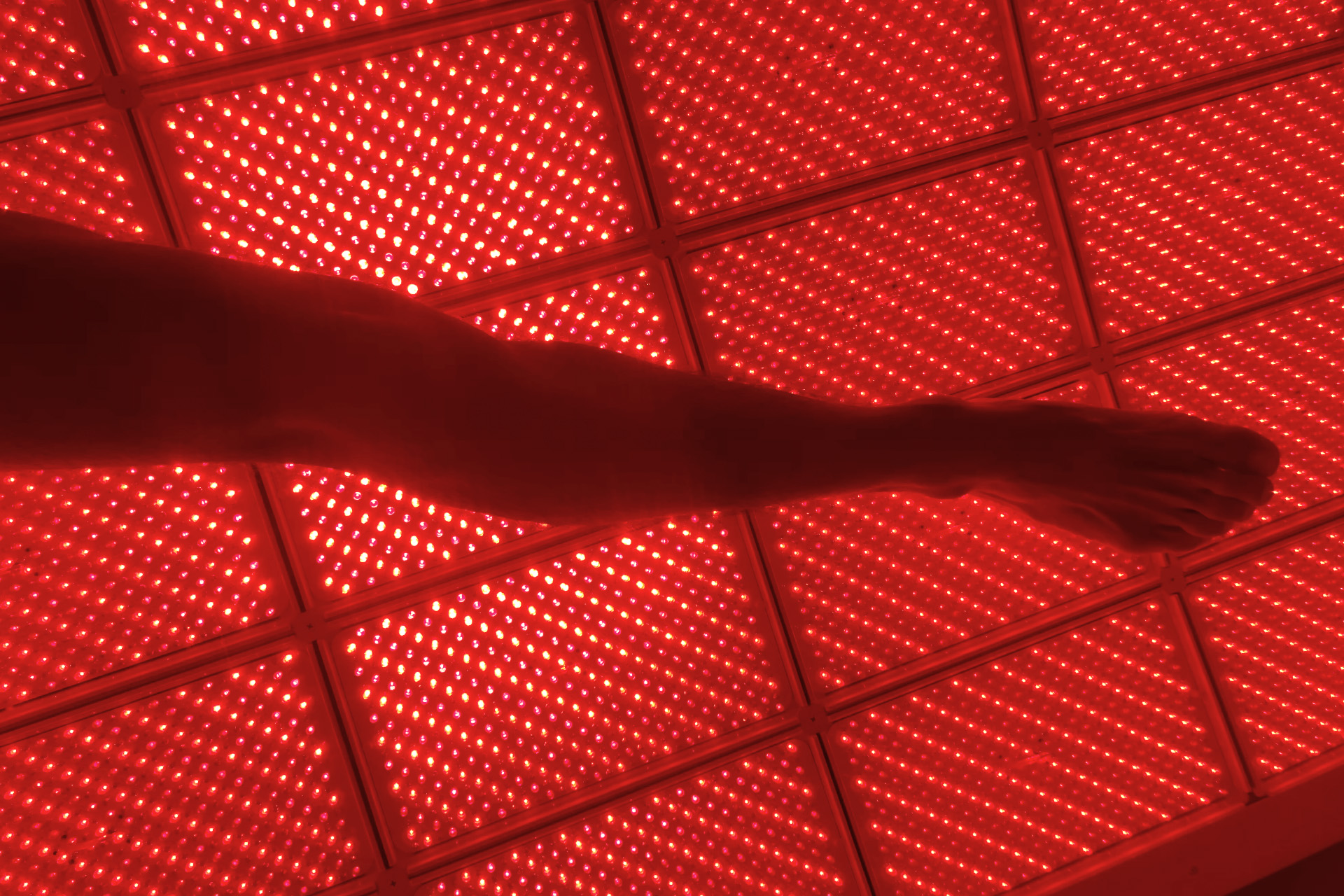Physiotherapy Knee Pain Treatment in Singapore

Knee pain is one of the most common types of musculoskeletal issues we treat at our private physiotherapy clinic that affects people of all ages. The cause of knee pain can result from a host of issues from a simple sprain to more serious anterior cruciate ligament injuries.
The knee joint is one of the most important joints in our body to allow fluid movement and to support the body’s weight. From the outside, we might think of the knee as a simple hinge. But in truth, our knees are a complex system of muscles, tendons and bone.
Keeping that knee joint healthy is critical for our simplest everyday activities from walking to grab lunch or bending over to pick up our children. What may start as a slight niggling pain when walking or jogging can worsen, and eventually make even simple activities painfully difficult.
Various conditions can lead to knee pain, each of which require different treatment regimens. Our physiotherapists are expertly trained in what causes musculoskeletal disorders and bring the latest evidence-based knowledge, adjunctive technologies, and effective therapies to improve patient outcomes.
What Are The Most Common Knee Injuries We See at Our Clinic
Knee injuries are both common and complicated. Any damage to the knee can involve a variety of structures, such as tendons, bones, cartilage, or joints. Over time, a knee injury without adequate treatment can cause lasting damage and have permanent consequences.
Knee pain can be a common occurrence for both athletes and non-athletes. Physio for knee pain can heal most dysfunctions, but it’s essential to consult with a knowledgeable medical provider to determine the cause and develop a treatment plan. If the knee pain persists, physiotherapy can help you recover through exercises that mobilize your joints, build strength, and allow you to return to your daily activities.
Explore Knee Conditions

How Can Physiotherapy Help with Knee Pain
Physiotherapy is vital for injury rehabilitation, rebuilding muscle strength, and ultimately, lowering your chances of future musculoskeletal injuries. Knee physiotherapy protocols may consist of non-invasive methods to relieve pain and promote healing. Our trailblazing rehabilitation combine complementary therapies to improve your overall wellbeing:
- Manual therapy and Clinical Pilates to readjust movement patterns to build strength, improve mobility and regain full range of motion.
- INDIBA radiofrequency to aid in soft and hard tissue healing from at the cellular level.
- Shockwave Therapy to stimulate soft tissue healing. It improves vascularization and reduces scar tissue buildup.
- MAGNETOLITH Electromagnetic Transduction Therapy to promote the proliferation of fibroblast and collagen for degenerative diseases.
- LightSpeed Lift to reduce body weight with an “anti-gravity” weight support system helps you walk more quickly after knee surgery.
- Red Light Therapy to relieve pain from arthritic conditions, body aches, and muscles. Plus, the difference is that our LightStim red light bed is FDA-cleared for these conditions.
Physiotherapy is an essential part of healing from your injury and preventing imperceptible injuries that may take months to years to present as an injury. We can help with anything from simple sprains to post-surgical recovery – even the most debilitating chronic arthritic pain or osteoporosis.
Our physical therapist will work with you to create a personalized rehabilitation plan, educate you about symptoms management and prescribe an exercise program. Our team often works with orthopedic surgeons to improve post-surgical outcomes following an invasive procedure.
Any of the following conditions can cause knee pain and injuries, some of which are preventable and others requiring surgery:
- Arthritis is a condition that can cause pain and discomfort to your joints. A physiotherapist can help you improve your movement and mobility, and relieve some of the arthritic pain, so you don’t injure or damage your joints long-term.
- ACL Injuries or Anterior Cruciate Ligament injuries are common in people who participate in sports such as soccer. They usually require a lot of rest and rehabilitation before recovery, occasionally necessitating surgery, or ACL reconstruction, to replace the torn ligament.
- Bursitis can also afflict the knees, as well as the hip. Recovery from knee pain with physiotherapy are possible with the proper diagnosis and treatments.
- Chondromalacia Patellae (CMP) occurs more often in young adults, often felt during activities like running and kneeling when pain and inflammation are felt around the kneecap. A comprehensive physio plan treats CMP by strengthening key muscles around the knee, which can help improve muscle balance and prevent future kneecap misalignment.
- Knee Replacement is sometimes necessary if a knee injury does not improve with nonsurgical methods and the patient has difficulty walking even with support. The surgery can help relieve pain and help the patient resume daily activity. Follow-up physiotherapy is imperative for the best results post-surgery. The treatment plan will help your recovery and even help with post-operative pain.
- Meniscus Tears are one of the most common knee injuries, which can occur from a sudden injury or repetitive motions. This condition can cause mild to severe pain, swelling, and stiffness. A physiotherapist can provide nonsurgical treatment for a torn meniscus.
- Osteoarthritis can occur in any joint, including the knee. The wear and tear of the knee joint can make movement difficult, requiring treatment to alleviate pain and prevent further deterioration. Your physiotherapist can help strengthen your muscles, improving your physical function without increasing pain or medications.
- Patellar Maltracking is a condition that results when the dynamic link between the patella and the trochlea is disrupted. In layman’s terms, the knee’s movement is not aligned with the leg, which an underlying structural problem can often cause. Physiotherapy treatment can help reduce your discomfort, improve your quadriceps strength and endurance, and get you back to normal.
- Patellar Tendonitis, also known as ‘jumper’s knee’, can happen with the overuse of the kneecap. Frequent activities, like jumping, can stress the tendon, causing inflammation. Your physiotherapist can help ease the pain and prevent the condition from worsening.
- Knee Dislocation is a rare but severe injury in which the thigh bone (femur) and shin bone (tibia) separate. Adhering to an extensive physiotherapy and rehabilitation program is essential to restoring near-normal to normal knee function.
- Patellofemoral Pain Syndrome is a blanket term to describe pain felt around the front of the knee or near the kneecap. Like many other knee injuries, it stems from overuse and can worsen over time, making basic movement uncomfortable. Most patients respond well to physiotherapy rehabilitative treatment plans.
- Runner’s Knee is a painful condition that can make it difficult to enjoy activities like running or walking. Symptoms include rubbing, grinding, or clicking sounds in the kneecap. Physiotherapy for runner’s knee involves identifying and addressing contributing factors through corrective exercises and manual therapy.
- Fractures are prevalent, especially amongst very active people. Physiotherapists can help treat fractures and injuries, helping patients return safely to their usual activities.
- Post-Traumatic Arthritis is a type of secondary osteoarthritis that occurs due to a specific joint injury. Although it can affect any joint, the knees are one of the most common, and symptoms may appear up to five years after an injury. Knee pain physio can help manage pain and swelling, improve range of motion, and prevent further joint damage. Physiotherapy is also essential to post-surgical care for patients with post-traumatic arthritis.
- Sprains and Strains can be an acute or overuse injury before providing a treatment plan and instructions for exercises you can do at home. Depending on the severity of your injury, you may need crutches, a brace, or surgery.
- Tendinitis can also afflict the knee. It is a painful condition caused by repetitive activities, overuse, or injury. It most frequently occurs in the elbow, knee, shoulder, hip, Achilles tendon, and base of the thumb. Most cases can be successfully treated with physiotherapy. However, surgery may be required if your tendonitis has led to your tendon rupture.
If you’re looking for knee pain physiotherapy near you, contact our clinic today to get the proper diagnosis and treatment for your musculoskeletal condition or soft tissue injury.

Leading Physiotherapy Knee Pain Treatments
Knowing when and how to modify your functional activities to get through your day safely is essential in managing chronic joint pain. This is important in managing knee pain, as dysfunction in these joints can increase the risk of balance problems and falls.
The knee is a vital part of the human body and can cause problems in different parts of the body. Chronic knee pain can be caused by many conditions, which are included above. What is important is that your injury is tended to so that the pain does not increase, or worse, other parts of your body accumulate injuries. For example, a knee injury can lead to ankle pain if the leg cannot step correctly due to knee instability.
Sometimes, patients find it too difficult to return to everyday activities without rehabilitation. This can be due to post-injury muscle weakness or simply that traditional physiotherapy takes too long to show results and reduce pain.
One rehabilitation treatment we use at HelloPhysio to treat patients is Shockwave Therapy. Precise radial shockwaves are applied to specific muscle groups to promote healing and reduce pain. Shockwave Therapy can help patients in the second or third sessions, offloading the stress and allowing them to return to their physiotherapy exercises.
Sometimes, Shockwave Therapy is enough on its own to stimulate the healing process; the treatment regenerates tissue to enable the injury to recover without invasive treatment.
Another evidence-based treatment we use is INDIBA Thermal Radiofrequency. Like Shockwave Therapy, INDIBA sends wave frequency, noninvasively at safe levels, into the body to stimulate cell growth. These technologies allow patients to avoid pain medication, reducing pain without using drugs.
Some people are wary of long-term pain medication and may gradually have to wean off the prescriptions. Healing the body naturally through physiotherapy can quicken the healing cycle effectively and non-addictive. Each interval, the body adjusts, and the patient is forced to reduce activity. Shockwave Therapy and INDIBIA Thermal Radiofrequency can keep you active and healthy.
Make a Physiotherapy Appointment to Treat Your Knee Pain
HelloPhysio’s multidisciplinary team of rehab experts works to identify all the factors related to your knee pain from lifestyle choices to develop the right recovery plan for you.
Contact us today if you have knee pain from runner’s knee to chronic arthritis, or are recovering from surgery. Our team at HelloPhysio helps speed up your recovery process to relieve pain and restore movement as quickly and safely as possible. No matter your situation, our industry-leading technologies, treatments, and prescriptive exercises achieve lasting results.
We complement our manual therapy with the latest adjunct modalities and evidence-based education to help you build a resilient foundation for your recovery and overall musculoskeletal health.
